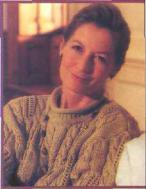
English_books / New Headway int sb
.pdf
PRACTICE
1Pronunciation and speaking
1Work in pairs. Respond to the following situations using the word or words in brackets and the perfect infinitive (have + past participle). Take it in turns to read aloud and respond.
Example
Student A I can't find my ticket, (must, drop)
Student B You must have dropped it.
aJohn didn't come to school yesterday, (must, ill)
bLook at my new gold watch! (can't, buy yourself)
cWhy is Isabel late for class? (might, oversleep)
dI can't find my homework, (must, forget)
eThe teacher's checking Maria's work, (can't, finish already)
fDid you know that Charles got top marks in the exam? (must, cheat)
gWhere's my umbrella? (could, leave it on the train)
2 T.64 Listen and check your answers. Do the exercise again paying particular attention to stress and intonation.
2 Discussing grammar
1 Fill in the gap in the second sentence with the modal verb in the past. Discuss your answers with a partner. (This exercise includes modal verbs of obligation and ability.)
aThe pond is frozen. It must be very cold outside, (present probability)
You . very cold when you were out skiing.
(past probability)
bYou must do your homework tonight, (present obligation)
When I was at school we _____ homework every night, (past obligation)
c |
He can't be a member of the football team. He's . |
||||||
|
hopeless at all sports! (present probability) |
||||||
|
He |
|
. |
a member of his school football learn. He |
|||
|
|
|
|
|
|
|
|
|
was hopeless at all sports, (past probability) |
||||||
d |
Jane can swim really well, (present ability) |
||||||
|
She |
|
|
|
|
really well when she was just eighteen |
|
months old. (past ability)
2Work in pairs. Look at the list of modal auxiliary verbs. How many can you fit naturally into each gap? Discuss with your partner the differences in meaning.
can can't could must might shall should
a |
He |
have been born during World |
||
|
War II. |
|
||
b |
|
|
|
you help me with the washing up, |
|
please? |
|
||
c |
You |
see the doctor immediately. |
||
d |
It |
be raining. |
||
e |
|
|
|
we go out for a meal tonight? |
f |
I |
stop smoking. |
||
g |
It |
have been Bill that you met at the |
||
|
party. |
|
||
h |
I |
|
|
learn to speak English. |
LANGUAGE REVIEW
must, could, might, can't
1 Must, could, might, and can't are used to express degrees of probability about the present.
He must be in love. |
|
= very probable that he is in love |
95% sure |
He could be in love. |
|
He might be in love. |
45% sure |
= possible, but less probable |
|
He can't he in love. |
|
- very probable that he is not in love i |
95% sure |
2They are used to express degrees of probability about the past (using the perfect infinitive).
He must have been in love.
= very probable that he was in love
He couldhave been in love. He might have been in love. = possible, but less probable
He can't have been in love.
— very probable that he was not in love
3 They can also be used with the continuous infinitive.
You must bejoking!
She could be having a shower.
It maylmight have been mining.
4 May can be used instead of might and could.
Grammar Reference: page 153.
90 Unit 9 Relationships
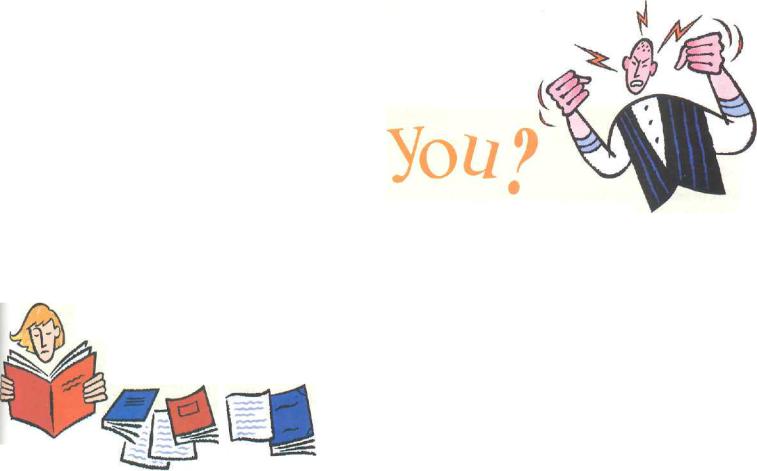
VOCABULARY AND SPEAKING
Character adjectives
What sort of person are
1 Are you usually smiling and happy? |
• |
2 Do you enjoy the company of other people? |
3Do you find it difficult to meet new people?
4Is it important to you to succeed in your career?
5Does your mood change often and suddenly for
no reason? |
• |
6 Do you notice other people's feelings? |
|
7 Do you think the future will be good? |
|
8 Can your friends depend on you? |
• |
9 Is your room often in a mess? |
Work in pairs.
1Do the personality quiz above to discover what type of person you are. Use a dictionary to check any new words. Write Y for Yes, N for No, and S for Sometimes.
2Ask your partner to do the quiz about you.
Look at your ideas and your partner's ideas about you. Are they the same?
3Match these adjectives with the questions in the quiz.
a |
untidy |
9 |
lazy |
b |
optimistic |
|
i generous |
c |
sociable |
|
moody |
|
talkative |
|
hard-working |
|
reserved |
|
easy-going |
|
shy |
|
reliable |
|
impatient |
|
cheerful |
|
ambitious |
|
sensitive |
Which are positive qualities and which are negative1} Which could be both?
4What is the opposite of each of the sixteen adjectives in Exercise 3?
Remember that the prefixes in- and un- can sometimes be used to make negatives. Which of the adjectives above can use these?
5 Describe someone in the class to your partner but don't say who it is. Can your partner guess who it is?
10 Do you get annoyed if you |
|
|
|
have to wait for anyone or anything? |
• |
11 |
Do you put off until tomorrow what |
|
|
you could do today? |
• |
12 |
Do you work hard? |
• |
13 |
Do you keep your feelings and ideas to yourself? |
• |
14 |
Do you often give presents? |
• |
15 Do you talk a lot? |
• |
|
16 |
Are you usually calm and not worried by things? |
• |
LISTENING AND SPEAKING
Brothers and sisters
Pre-listening task
Do a class survey.
Find out who has any brothers and/or sisters. How many? Who has the most? Do they like having lots of brothers and sisters? Does anyone have a twin?
How many only children are there in the class? Do they like being an only child?
Listening and note-taking
T.65 Listen to two people talking about their families. First listen to Jillie, and answer the questions.
-How many brothers and sisters does she have?
-Was she happy as a child? Why? Why not?
-Is she happy now? Why? Why not?
-How has the family changed over the years?
-What do you learn about other members of her family and friends?
Now listen to Philippa and answer the same questions.
Discussion
-How many children do you have/would you like to have?
-What size is the perfect family?
-Would you like to have twins?
Relationships Unit 9 91
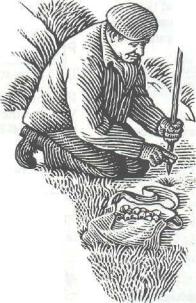
READING AND SPEAKING
Pre-reading task
Read the following quotation,
'Only when the last tree has died and the last river has been poisoned and the last fish has been caught will we realize that we can't eat money.'
Work in small groups. Who do you think said it?
a |
A political leader. |
d |
An African fisherman, |
b |
A member of Greenpeace. |
e |
A Greek philosopher, |
c |
An American Indian. |
f |
A French farmer. |
When do you think it was said?
aIn the 5th century BC.
bIn the 19th century.
cIn the 20th century.
Your teacher will give you the correct answer.
Reading
You are going to read some extracts from a story by the French writer, Jean Giono (1895-1971), called The Man Who Planted Trees. In it Giono describes the world of a solitary shepherd who plants trees, while in the background there are two world wars.
T.66a Read and listen to the extracts and answer the questions after each one,
THE MAN WHO
PLANTED TREES
Extract 1
About forty years ago, I was taking a long trip on foot over mountain heights quite
unknown to tourists. All around was barren and colourless land. Nothing grew there but wild lavender.
5 After five hours' walking I had still not. found water. All about me was the same dryness, the same coarse grasses. I thought I saw in the distance a small black silhouette. It was a shepherd. Thirty sheep were lying about him on the baking earth. He gave me a
io drink and took me to his cottage on the plain.
I felt peace in the presence of this man. I asked if I might rest here for a day. He found it quite natural—or, to be more exact, he gave me the impression that nothing could surprise him. I didn't 15 actually need to rest, but I was interested and wished
to know more about him.
1 Giono wrote the story in 1953. In which year does the actual story begin?
2The story takes place in France. Which part of France do you think it is? Why? What is the countryside like?
3Why do you think the writer is interested in the shepherd? What do you think he likes about his lifestyle?
The shepherdputs a large sack of acorns onto the table. He inspects each acorn and carefully chooses one hundred perfect ones before going to bed. The writer is curious. The next day when he goes out with the shepherd into the hills, he discovers what the acorns arefor.
T.66b Extract 2
I noticed that he carried for a stick an iron rod as thick as my thumb and about a metre and a half long. He began thrusting his iron rod into the earth, making a hole in which he planted an acorn; then he refilled the hole. He was planting oak trees. 5
After the midday meal he resumed his planting. |
|
I suppose I must have been fairly insistent in my |
|
questioning, for he answered me. For three years he |
|
had been planting trees in this wilderness. He had |
|
planted one hundred thousand. Of the |
10 |
hundred thousand, twenty thousand had |
|
sprouted. Of the twenty thousand he still |
|
expected to lose half. There remained |
|
ten thousand oak trees to grow where |
|
nothing had grown before. |
15 |
That was when I began to wonder about the age of this man. He was obviously over fifty. Fifty-five he told me. His name was Elzeard Bouffier. I told him that in thirty 20 years his ten thousand oaks would be magnificent. He answered that if God granted him life, in another thirty years he would have planted so many more that these ten 25 thousand would be like a drop of water in the ocean.
The next day we parted.
4How old do you think the writer was at the time of the story? A boy in his teens? In his twenties? Middleaged? Older? Why?
5How old will Elzeard be in thirty years time? What year will it be?
6What do you think Elzeard's ambition is? What is his vision of the future?
92 Unit 9 Relationships
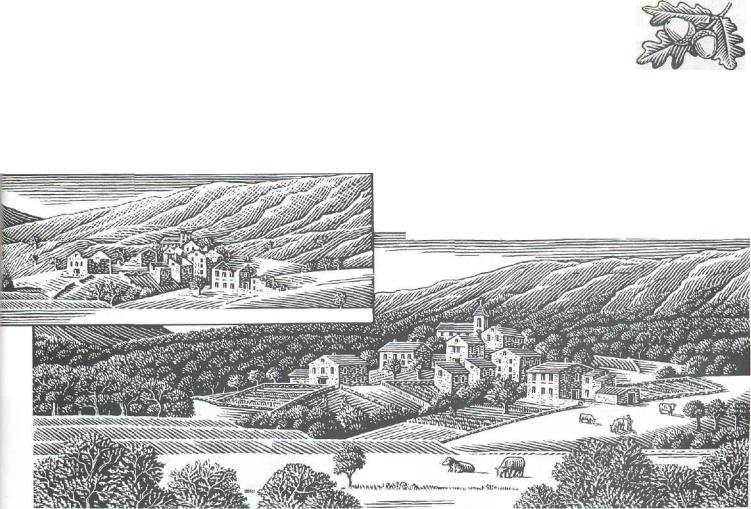
For the next five years the writer is a soldier and fights in
World War I. The war ends in 1918 and his thoughts turn again to the tree-planter in the mountains. He returns to lookfor him.
T.66C Extract 3
I had seen too many men die during those five years not to imagine easily that Elzeard Bouffier was dead, especially since, at twenty, one regards men of fifty as old men with nothing left to do but die. He 5 was not dead. As a matter of fact, he was extremely well. He had changed jobs. He had got rid of the sheep because they threatened his young trees. For, he told me, the war had disturbed him not at all. He
had imperturbably continued to plant.
10 The oaks were then ten years old and taller than both of us. It was an impressive spectacle. I was literally speechless, and as he did not talk, we spent the whole day walking in silence through his forest. It measured eleven kilometres in length and
is three kilometres at its greatest width. When you remembered that all this had come from the hands and the soul of this one man, you understood that men could be as effective as God in ways other than destruction.
7Why did the writer think that Elzeard might have died?
8How had the war affected Elzeard?
9Why is the writer speechless?
10 What thoughts about human behaviour does he have in the last sentence?
The writer returns for a final visit in 1945 after World
War II. Elzeard is still alive. The writer is amazed at what he sees. Not only is there theforest, but many villages have been rebuilt, and by 1953 more than ten thousand people in the area owe their happiness to Elzeard Bouffier.
T.66d Extract 4
The bus put me down in Vergons. In 1913 this village of ten or twelve houses had three inhabitants. All about them nettles were feeding upon the remains of abandoned houses. Now everything had changed.
5 Even the air. Instead of the harsh dry winds, a gentle breeze was blowing, laden with scents. A sound like water came from the mountains: it was the wind in the forest. Most amazing of all, I heard the actual sound of water falling into a pool. I saw a fountain
10 had been built. Ruins had been cleared away, and five houses restored. Now there were twenty-eight inhabitants, four of them young married couples. It was now a village where one would like to live.
When I think that one man was able to cause 15 this land of Canaan to grow from wasteland, I am
convinced that in spite of everything, humanity is good.
Elzeard Bouffier died peacefully in his sleep in 1947.
11What has happened in the writer's life that could have made him pessimistic?
Is he in fact pessimistic about the world? Give a reason for your answer.
12How is it that so many people owe their happiness to one man? What are the results of his tree-planting?
13How old is Elzeard when he dies? Why is it so important that he had a long life?
Relationships Unit 9 93
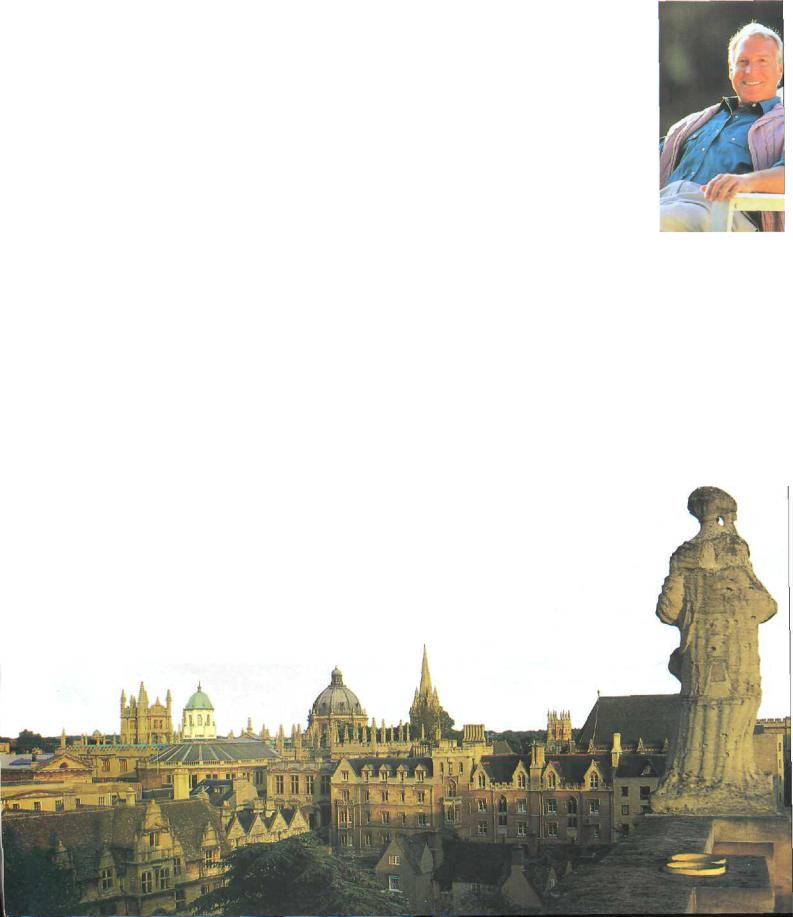
What do you think?
Work in groups.
1 Do you think the story about Elzeard is true? Do you think Elzeard was ever married?
Give reasons for your opinions. Your teacher will tell you if you are correct.
2How would you describe the personality of Elzeard Bouffier? Do you know any people like him in your life?
3In the context of the twentieth century and its two world wars, what message is Giono trying to make about nature and the importance of individual human beings?
(This little book has been translated into over a dozen languages. Perhaps you could read the whole book in your own language, or better still, read it in English.)
WRITING
Sentence combination
1 Read the sentences about Elzeard Bouffier and then compare them with the paragraph below. Note the ways in which the sentences are combined.
Elzeard Bouffier was a shepherd. He was poor.
He was solitary.
He lived in the mountains. The mountains were barren. They were in southern France. Elzeard had a love of nature. He had an incredible idea.
During his life he planted thousands of acorns. The acorns grew into a forest of oak trees.
The forest made the countryside rich and fertile again. He died when he was 89.
Elzeard Bouffier was apoor, solitary shepherd, who lived in the barren mountains of southern France. His love ofnature gave him an incredible idea. During his life he planted thousands of acorns. These grew into a forest of oak trees, which made the countryside rich and fertile again. Elzeard died when he was 89.
2 Rewrite each group of sentences to form a more natural sounding paragraph.
aA person
Alan Higgins is a writer. He is famous.
He is a millionaire.
He comes from the north of England.
He has gone to live in the USA. He has written twenty-rive novels. His novels have been translated
into five languages. Hollywood is going to make a
film of his latest novel.
The film will star Sunny Shaw. Sunny Shaw's last film was a big box office hit. The film was called Hot Night in the Snow.
bA place
Oxford is a city.
It is a city in the south of England. It is on the River Thames.
It has a population of about 100,000. The city is famous.
It has one of the oldest universities in the world. It has lots of other old buildings.
It has the Bodleian Library.
It has the Ashmolean Museum. The Ashmolean was built in 1683.
Oxford was once the capital of England. Not many people know this about Oxford. Charles I made it the capital.
It was the capital from 1642-1645.
3 Write a short profile of a person (it could be you) and a place that are important to you.

So do II Neither do I!
1 Read the statements in the chart below. Complete the You column by putting (/) if it is the same for you and (X) if it isn't.
You |
Polly |
Polly's words |
I want to travel the world. |
|
|
I don't want to have lots of children. |
|
|
I can speak four languages. |
|
|
I can't drive. |
|
|
I'm not going to marry until I'm 35. |
|
|
I went to America last year. |
|
|
I have never been to Australia. |
|
|
I don't like politicians. |
|
|
I am bored with the British Royal Family. |
|
|
I love going to parties. |
|
|
2 T.67 Listen to Polly. She is at a party and lots of friends are talking to her about themselves. Complete the Polly column by putting (/) for what is the same and (X) for what is not the same for Polly.
3 Listen again and write on the chart the exact words that Polly uses. Choose from the lists below.
So am 1. |
So do 1. |
So can 1. |
So did 1. |
So have 1. |
Neither am 1. |
Neither do 1. |
Neither can I. |
Neither did 1. |
Neither have |
1am. |
Ido. |
1can. |
Idid. |
1have. |
I'm not. |
1 don't. |
1can't. |
1 didn't. |
1 haven't. |
What does she say when it is the same for her?
What does she say when it is different?
CO Grammar Reference: page 153.
4Work in pairs.
Read out the statements in Exercise 1 to each other and give the correct response for you.
5Go round the class.
Everyone must make a statement about themselves or give an opinion about something. The others in the class must respond.
Examples |
|
Student 1 |
/ love chocolate ice cream! |
Other students |
So do 1.1 Me too. |
|
I don't! |
Student 2 |
I didn't do my homework. |
Other students |
Neitherdid1.1Meneither. |
|
Idid! |
Relationships Unit 9 95
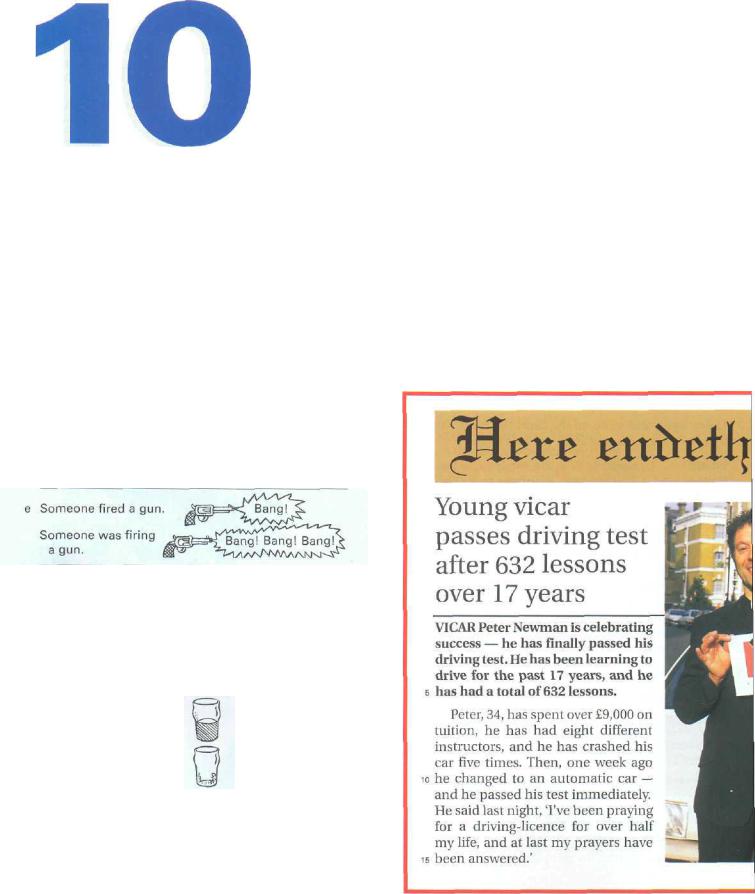
Obsessions
Present Perfect Continuous Time expressions Complaining
Test your grammar
1 For each pair, match a line in A with a line or picture in B.
aWhat do you do What are you doing
bShe smokes She's smoking
cHe has
He's having
dYou're stupid. You're being stupid.
fThe cat drowned. The cat was drowning
gWhat have you done
with my headphones? What have you been
doing
h Who has drunk my beer?
Who has been drinking my beer?
B
on your hands and knees? for a living?
twenty cigarettes a day. a Russian cigarette.
a bath. He can't come to the phone,
a lot of money.
You always are.
You aren't usually.
so I jumped into the water and saved it.
It was terribly sad.
I can't find them.
since I last saw you?
2Look at the second sentence of each pair. What do the verbs have in common?
PRESENTATION (1)
Present Perfect Continuous
1 Look at the newspaper headline and the picture of Peter.
-What's Peter's job?
-What has he passed?
-'L' stands for Learner. What are L-plates on a car for?
-What is he tearing up? Why?
-Can you explain the play on words in the headline?
96 Unit 10 Obsessions

2T.68 Read and listen to the article. Then answer the questions.
-Why is Peter celebrating?
-Was it easy?
-What helped him to pass his test?
-What was his first accident?
-What was his big problem with driving?
-What has happened to his instructors? Why?
-Why hasn't he seen some of his relatives for so long?
3Here are the answers to some questions. Write the questions using he. They all contain either the Present Perfect Simple or Continuous.
aSeventeen years. (How long has he ...?)
b632. (How many ...?)
cOver £9,000. (How much ...?)
dEight. (How many ...?)
eFive times. (How many times ...?)
fFor over half his life. (How long ...?)
gThat he would never pass. (What ...?)
hFifty-six times. (How many ...?)
iBy visiting relatives and people in the remote villages. (How ...?)
T.69 Listen and check your answers.
Peter, of St Andrew's Church, Repton in |
|
Nottinghamshire, began driving at the age of 17. |
|
'It was in the country,' he said, 'and T was |
|
doing quite well until one morning, in a |
|
narrow lane, I saw a tractor coming towards |
|
me. I panicked and drove into a ten-foot |
|
hedge.' |
|
Peter said, 'My big problem was confusing |
|
the clutch and the brake. I was absolutely |
|
hopeless. My instructors have been telling me |
25 |
for years that 1 would never pass, but I was |
|
determined to prove them wrong. Many of |
|
them have turned grey because of me!' |
|
The turning-point came when Peter tried |
|
an automatic, and took his test again — for the |
|
fifty-sixthtime. |
|
He said, 'When I was told I'd passed, I went |
|
down on my knees and thanked God.' |
|
So how has he been celebrating? I've been |
|
visiting all my relatives and people who live in |
35 |
the remote villages around here. I haven't seen |
|
some of them for years because I haven't been |
|
able to get to them. Now I can go anywhere!' |
|
• Grammar questions
Find the examples of the Present Perfect Simple and Continuous in the text.
- What is the difference between the Present Perfect Simple and Continuous?
He has been learning to drivefor 17 years.
He has had 632 lessons.
-Which describes a completed action}
-Which describes an activity over a period of time'!
PRACTICE
1 Questions and answers
1 |
T.70 Listen to two people talking about driving |
||||
|
|
and cars. Complete the questions. |
|||
a |
|
|
|
drive? |
|
b |
How long |
|
|||
c |
|
|
|
a car? |
|
d |
How long |
|
|||
e |
How much |
pay |
|||
f |
How many kilometres |
|
|||
g |
|
|
ever |
|
|
|
|
|
|
|
|
hWhose fault
Ask and answer the same questions across the class.
2Write a question with How long ...? Use either the Present Perfect Simple or Continuous. Tf both are possible, use the Continuous.
a |
I live in the country. |
How long |
b |
I play a lot of tennis. |
How long |
c |
I know Jack well. |
How long |
d |
I work in Prague. |
How long |
e |
I have an American car. |
How long |
3Make statements about yourself using the same verbs. In pairs, ask and answer questions with How long ...?
4For each of the sentences in Exercise 2, write another question in the Past Simple.
a |
When |
|
|
move there? |
b |
How old |
|
when |
|
|
started _ |
? |
||
c |
Where |
|
meet |
|
d |
Why |
decide |
||
e |
How much |
|
pay |
|
Obsessions Unit 10 97
